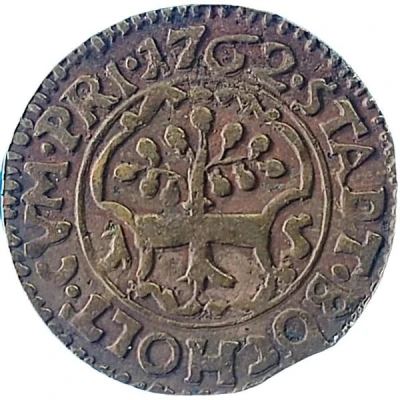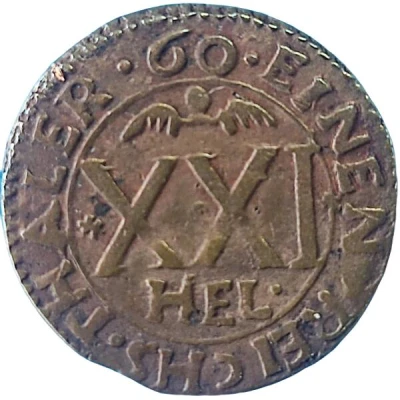


© mikirada (CC BY-SA)
21 Heller
| Copper | 2.09 g | 21 mm |
| Issuer | City of Bocholt (German States) |
|---|---|
| Period | Free city |
| Type | Standard circulation coin |
| Years | 1761-1762 |
| Value | 21 Heller = 10.5 Pfennige = 1⁄60 Reichsthaler |
| Currency | Thaler |
| Composition | Copper |
| Weight | 2.09 g |
| Diameter | 21 mm |
| Thickness | 1 mm |
| Shape | Round |
| Orientation | Medal alignment ↑↑ |
| Demonetized | Yes |
| Updated | 2024-10-04 |
| Numista | N#35945 |
|---|---|
| Rarity index | 76% |
Reverse
Coat of arms of Bocholt
Script: Latin
Lettering:
60 EINEN REICHS THALER
XXI
HEL
Edge
Plain
Comment
Bocholt was first written about in 779, when Charlemagne won a battle against the Saxons nearby. However the settlement was probably much older. Bishop Dietrich III von Isenburg from Münster gave Bocholt city rights in 1222.In the 15th century the city flourished. The engraver Israhel van Meckenem lived and worked in the city.
Between 1803 and 1810 Bocholt was the capital of the Principality of Salm. The Principality of Salm was governed by the prince of Salm-Salm and the prince of Salm-Kyrburg.
During the Second World War the city survived generally unscathed until an Allied bombing raid on 22 March 1945 which destroyed most of the city. The city was then captured by the British a week later on 28 March. The city was the site of the Stalag VI-F POW camp.
In 1975 the former municipalities Barlo, Biemenhorst, Hemden, Holtwick, Liedern, Lowick, Mussum, Spork, Stenern and Suderwick were merged into Bocholt.
- - - - - - -
City of Bocholt in Westmünsterland near the Netherlands
Coat of arms: In a green field a silver beech tree with leaves and roots that has just grown up and torn out.
The coat of arms appears on the coins with the Münster crossbar halfway up.
At the request of the city in 1615, it received the notarized permission from the Prince-Bishop of Münster to issue copper money worth 400 thalers. It is not known whether a permit was granted for the later copper coinage from 1670 and 1689-90. Because there was too much copper in circulation, the issue of copper coins was prohibited in 1700. When it was minted again in 1761-62, permission from the cathedral chapter was available.
Catalogue: Weingarten 129
Interesting fact
The 21 Heller coin from Bocholt was minted during a time of great economic change in the German States. The coin was introduced as part of a new currency system aimed at standardizing currency across the various states, and it was the first coin to feature a standardized design across all the German States. This coin was also unique in that it was made of copper, which was a less valuable metal than the silver and gold coins that were commonly used at the time. Despite its relatively low value, the 21 Heller coin played an important role in the economy of the time and remains a valuable collector's item today.
Price
| Date | Mintage | VG | F | VF | XF | AU | UNC |
|---|---|---|---|---|---|---|---|
| 1762 | - | - | - | - | - | - |
Values in the table are based on evaluations by sales realized on Internet platforms. They serve as an indication only for 21 Heller 1761-1762 coin.